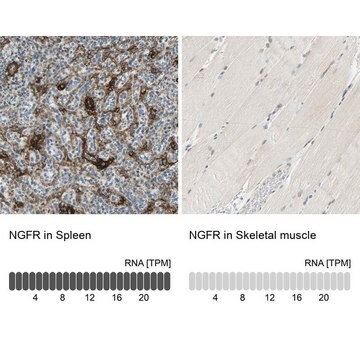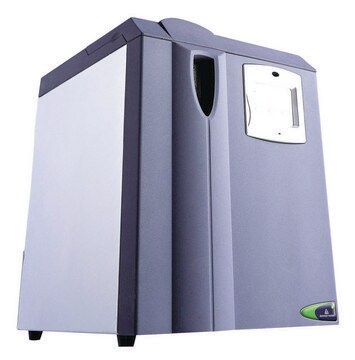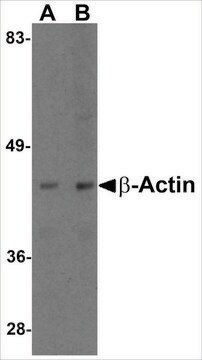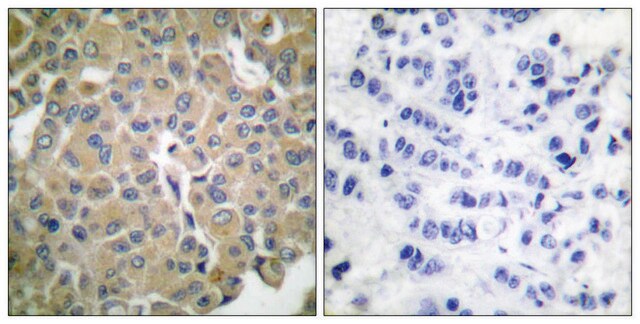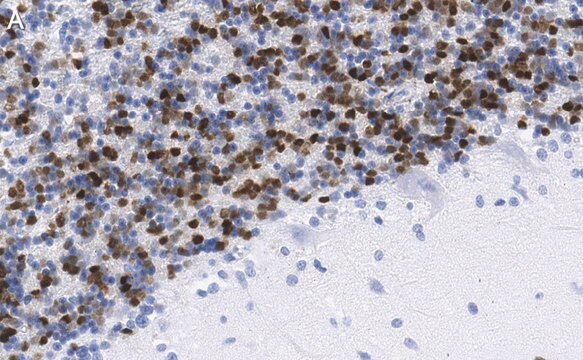MABN310
Anti-G-protein coupled receptor 56 (GPR56) Antibody, clone H11
clone H11, from mouse
동의어(들):
G protein-coupled receptor 56, 7-transmembrane protein with no EGF-like N-terminal domains-1, Protein TM7XN1, G-protein coupled receptor 56
로그인조직 및 계약 가격 보기
모든 사진(1)
About This Item
UNSPSC 코드:
12352203
eCl@ss:
32160702
NACRES:
NA.41
추천 제품
생물학적 소스
mouse
Quality Level
항체 형태
purified antibody
항체 생산 유형
primary antibodies
클론
H11, monoclonal
종 반응성
mouse
종 반응성(상동성에 의해 예측)
human (based on 100% sequence homology)
기술
immunocytochemistry: suitable
immunohistochemistry: suitable
western blot: suitable
동형
IgG1κ
NCBI 수납 번호
UniProt 수납 번호
배송 상태
wet ice
타겟 번역 후 변형
unmodified
유전자 정보
human ... GPR56(9289)
일반 설명
G-protein coupled receptor 56 (GPR56) is a ubiquitous adhesion receptor, which belongs to the G-protein coupled receptor 2 family and LN-TM7 subfamily. It is abundantly expressed in the in thyroid gland, brain, heart, and various tumor cells. Previous studies have suggested that GPR56 may inhibit the progression and metastasis of melanomas by interaction with extracellular-matrix proteins, such as Tissue Transglutaminase. GPR56 also plays a role in regulating VEGF production and angiogenesis via a PKCα-mediated pathway. GPR56 also plays a critical role in the development of the frontal cortex; previous studies have reported that mutations in GPR56 result in disorganized cortical lamination, which is most pronounced in the frontal cortex. This condition is known as bilateral frontoparietal polymicrogyria or BFPP.
면역원
N-terminal fragment of mouse GPR56
애플리케이션
Immunohistochemistry Analysis: A representative lot was used by an independent laboratory in E14.5 mouse brain tissue. (Luo, R., et al. (2011). Proc Natl Acad Sci U S A. 108(31):12925-12930.)
Immunocytochemistry Analysis: A representative lot was used by an independent laboratory in meningeal fibroblasts (MFs). (Luo, R., et al. (2011). Proc Natl Acad Sci U S A. 108(31):12925-12930.)
Immunocytochemistry Analysis: A representative lot was used by an independent laboratory in meningeal fibroblasts (MFs). (Luo, R., et al. (2011). Proc Natl Acad Sci U S A. 108(31):12925-12930.)
Research Category
Neuroscience
Neuroscience
Research Sub Category
Adhesion (CAMs)
Adhesion (CAMs)
This Anti-G-protein coupled receptor 56 (GPR56) Antibody, clone H11 is validated for use in Western Blotting, ICC, IHC for the detection of G-protein coupled receptor 56 (GPR56).
품질
Evaluated by Western Blot in brain tissue lysate from E13-E14 mouse.
Western Blot Analysis: 0.5 μg/mL of this antibody detected G-protein coupled receptor 56 in 10 µg of brain tissue lysate from E13-E14 mouse.
Western Blot Analysis: 0.5 μg/mL of this antibody detected G-protein coupled receptor 56 in 10 µg of brain tissue lysate from E13-E14 mouse.
표적 설명
~62 kDa observed. Full-length GPR56 (GPR56FL) migrates at 75 kDa and the cleaved extracellular domain of GPR56 (GPR56ECD) migrates at 62 kDa (J Biol Chem. 2008 May 23;283(21):14469-78).
물리적 형태
Format: Purified
Protein G Purified
Purified mouse monoclonal IgG1κ in buffer containing 0.1 M Tris-Glycine (pH 7.4), 150 mM NaCl with 0.05% sodium azide.
저장 및 안정성
Stable for 1 year at 2-8°C from date of receipt.
분석 메모
Control
Brain tissue lysate from E13-E14 mouse
Brain tissue lysate from E13-E14 mouse
기타 정보
Concentration: Please refer to the Certificate of Analysis for the lot-specific concentration.
면책조항
Unless otherwise stated in our catalog or other company documentation accompanying the product(s), our products are intended for research use only and are not to be used for any other purpose, which includes but is not limited to, unauthorized commercial uses, in vitro diagnostic uses, ex vivo or in vivo therapeutic uses or any type of consumption or application to humans or animals.
적합한 제품을 찾을 수 없으신가요?
당사의 제품 선택기 도구.을(를) 시도해 보세요.
Storage Class Code
12 - Non Combustible Liquids
WGK
WGK 1
Flash Point (°F)
Not applicable
Flash Point (°C)
Not applicable
시험 성적서(COA)
제품의 로트/배치 번호를 입력하여 시험 성적서(COA)을 검색하십시오. 로트 및 배치 번호는 제품 라벨에 있는 ‘로트’ 또는 ‘배치’라는 용어 뒤에서 찾을 수 있습니다.
D Daria et al.
Leukemia, 30(8), 1734-1741 (2016-04-12)
The G protein-coupled receptor 56 (GPR56) was identified as part of the molecular signature of functionally validated leukemic stem cells isolated from patients with acute myeloid leukemia (AML). This report now demonstrates particularly high expression of GPR56 in patients with
Gabriel S Salzman et al.
Proceedings of the National Academy of Sciences of the United States of America, 114(38), 10095-10100 (2017-09-07)
Adhesion G protein-coupled receptors (aGPCRs) play critical roles in diverse biological processes, including neurodevelopment and cancer progression. aGPCRs are characterized by large and diverse extracellular regions (ECRs) that are autoproteolytically cleaved from their membrane-embedded signaling domains. Although ECRs regulate receptor
Oladapo E Olaniru et al.
Molecular metabolism, 53, 101285-101285 (2021-07-06)
Members of the adhesion G protein-coupled receptor (aGPCR) subfamily are important actors in metabolic processes, with GPR56 (ADGRG1) emerging as a possible target for type 2 diabetes therapy. GPR56 can be activated by collagen III, its endogenous ligand, and by
Shih-Chia Huang et al.
EMBO molecular medicine, 9(12), 1660-1680 (2017-10-11)
Lymph node (LN) metastasis is commonly associated with systemic distant organ metastasis in human breast cancer and is an important prognostic predictor for survival of breast cancer patients. However, whether tumor-draining LNs (TDLNs) play a significant role in modulating the
Ayako Y Murayama et al.
Scientific reports, 10(1), 21516-21516 (2020-12-11)
GPR56, a member of the adhesion G protein-coupled receptor family, is abundantly expressed in cells of the developing cerebral cortex, including neural progenitor cells and developing neurons. The human GPR56 gene has multiple presumptive promoters that drive the expression of
자사의 과학자팀은 생명 과학, 재료 과학, 화학 합성, 크로마토그래피, 분석 및 기타 많은 영역을 포함한 모든 과학 분야에 경험이 있습니다..
고객지원팀으로 연락바랍니다.
